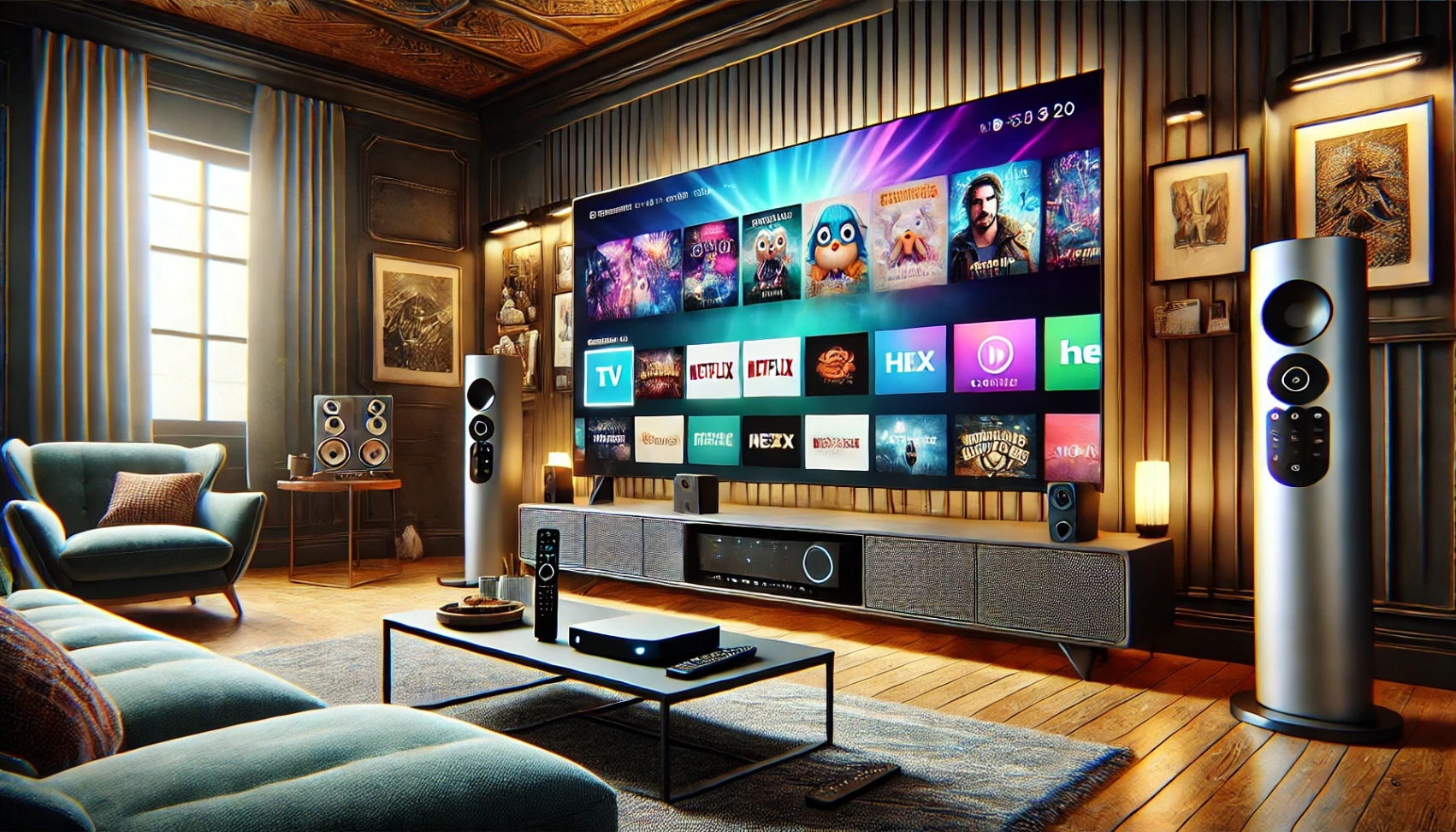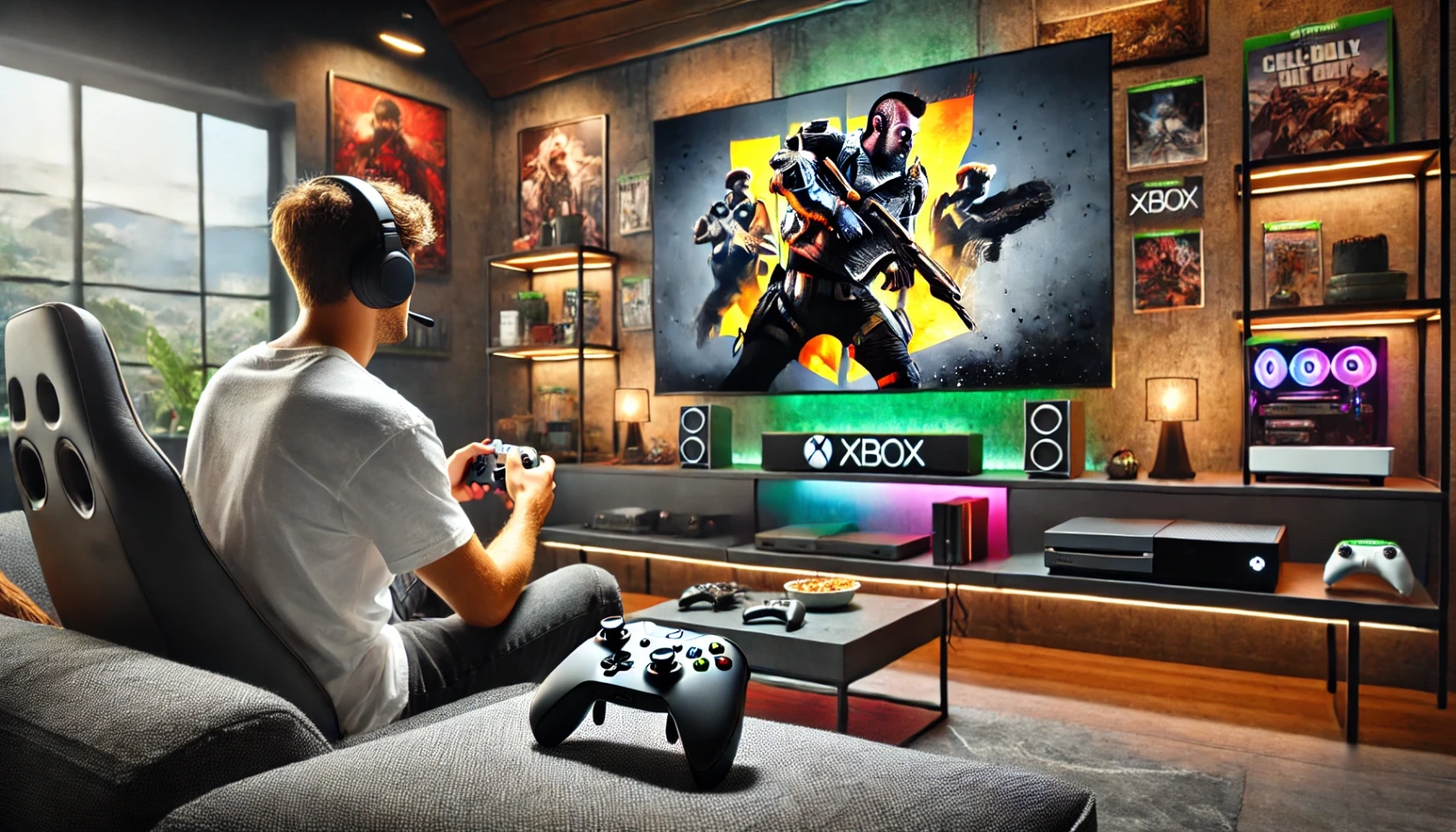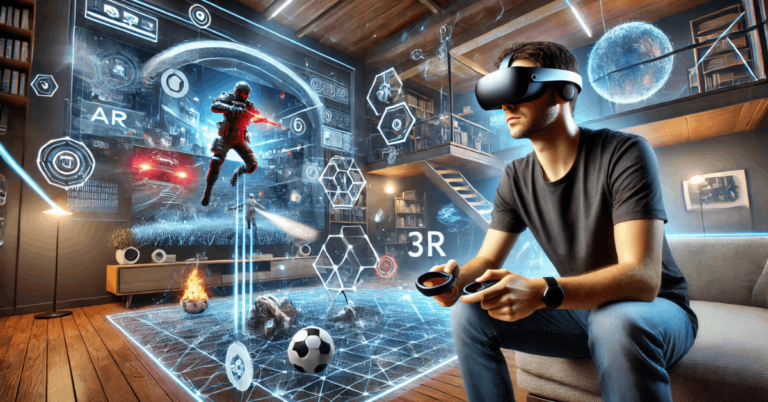Technology is transforming entertainment with new gadgets and trends.
This article covers VR headsets, smart TVs, wearable tech, AI, the metaverse, and cloud gaming.
Learn how these innovations reshape experiences and the future of entertainment.
Evolution of Entertainment Technology
Technology has revolutionized entertainment, evolving from essential tools to advanced digital ecosystems.
Here are the key milestones that shaped this transformation:
Early Analog Innovations
- Introduction of phonographs and silent films in the late 19th century
- The rise of radio broadcasting as a household medium in the early 20th century
Television Era
- Adoption of black-and-white TVs in the 1940s and 1950s
- Transition to color broadcasting in the 1960s, increasing global reach
Digital Revolution
- Emergence of CDs, DVDs, and MP3s in the 1990s
- Shift to digital streaming platforms for movies, music, and TV in the 2000s
Interactive and Immersive Media
- Introduction of video game consoles with 3D graphics
- Development of VR and AR technologies for gaming and storytelling
Mobile Entertainment
- Growth of smartphones and tablets as portable media hubs
- Rise of mobile apps for gaming, streaming, and social engagement

Gadgets Revolutionizing Entertainment
Innovative gadgets are transforming how people experience entertainment, offering more immersive, accessible, and interactive options.
Here are the key devices driving this revolution:
Virtual Reality (VR) and Augmented Reality (AR) Headsets
- Devices like Oculus Quest and HoloLens offer immersive gaming and interactive storytelling.
- AR-enabled gadgets enhance live sports and concerts with real-time overlays.
Smart TVs and Streaming Devices
- 4K and 8K TVs with AI-powered features like personalized recommendations.
- Devices like Roku and Amazon Fire Stick provide seamless access to streaming services.
Wearable Entertainment Tech
- Smartwatches and fitness trackers integrate entertainment apps.
- Haptic feedback suits and gloves enhance gaming experiences.
High-Quality Audio Devices
- Premium wireless headphones and earbuds like AirPods Pro and Sony WH-1000XM5.
- Smart speakers with spatial audio for enhanced music and movie experiences.
Portable Entertainment Devices
- Foldable smartphones and advanced tablets for streaming and gaming on the go.
- Handheld gaming consoles like Nintendo Switch and Steam Deck.

Trends Redefining Entertainment
Emerging trends are reshaping the entertainment industry, offering new ways to engage audiences and revolutionizing content delivery.
Here are the major trends driving this transformation:
Artificial Intelligence (AI) and Personalization
- AI curates personalized content recommendations on platforms like Netflix and Spotify.
- Interactive AI characters create dynamic storytelling experiences in games and virtual worlds.
The Metaverse
- Virtual worlds blend gaming, socializing, and commerce into immersive experiences.
- Platforms like Fortnite and Roblox lead the way in creating shared digital spaces.
Cloud Gaming
- Services like Xbox Cloud Gaming and GeForce Now allow gaming on any device without expensive hardware.
- Cloud gaming reduces barriers to entry and enables play-anywhere capabilities.
NFTs in Media
- Digital collectibles give fans exclusive ownership of content like art, music, and film memorabilia.
- NFTs open new revenue streams for creators and redefine fan engagement.
Interactive and Immersive Entertainment
- Choose-your-adventure films and VR-based storytelling offer unique user control.
- AR-enhanced concerts and sports events make live entertainment more engaging.
Interactive and Immersive Experiences
Advancements in technology are transforming entertainment into a more engaging and participatory experience.
Here are key examples of interactive and immersive innovations:
- Interactive Films: Viewers make decisions that shape the storyline, as seen in productions like Black Mirror: Bandersnatch.
- Virtual Reality (VR): Platforms like VRChat and games like Half-Life: Alyx create fully immersive environments.
- Augmented Reality (AR): AR apps enhance live events, such as concerts and sports, with real-time overlays.
- Immersive Theater: Productions like Sleep No More combine physical sets and digital effects for audience interaction.
- Haptic Technology: Devices with tactile feedback allow users to feel actions in virtual worlds.
Social Media Integration in Entertainment
Social media is reshaping entertainment, driving trends, and boosting audience engagement. Here are five key ways it’s changing the industry:
- Content Creation: Platforms like TikTok and Instagram allow creators to share short-form content globally.
- Live Streaming: YouTube Live and Twitch allow real-time interaction during events or shows.
- Fan Engagement: Celebrities connect with fans directly through Q&As and behind-the-scenes posts.
- Viral Marketing: Social media spreads movies, music, and shows through viral challenges and hashtags.
- Cross-Platform Integration: Streaming services and media use social platforms for promotions and live discussions.
Gamification of Entertainment
Gamification transforms the entertainment industry by integrating gaming elements into non-gaming platforms and experiences.
Here are some key ways this trend is shaping the future of entertainment:
- Streaming Services: Platforms like Netflix experiment with interactive storytelling, allowing users to make choices during shows.
- Fitness Apps: Apps like Peloton and Zwift gamify workouts with leaderboards, challenges, and virtual rewards.
- Esports Growth: Competitive gaming has become a significant entertainment sector, attracting global audiences and sponsorships.
- Educational Games: Platforms use gamified experiences to make learning entertaining and engaging.
- Brand Engagement: Companies use gamification in campaigns to create interactive and memorable brand experiences.
Audio Technology Innovations
Advancements in audio technology are elevating entertainment by offering more prosperous, more immersive sound experiences.
Here are the key innovations transforming audio in entertainment:
- Spatial Audio: Enhances immersion by creating 3D soundscapes, widely used in gaming and streaming platforms.
- High-Resolution Audio: Services like Tidal and Amazon Music HD deliver lossless audio for superior sound quality.
- Smart Speakers: Devices like Amazon Echo and Google Nest integrate voice assistants with high-quality audio playback.
- Noise-Canceling Headphones: Innovations like adaptive noise cancellation improve focus and sound clarity for listeners.
- Live Audio Streaming: Platforms like Clubhouse and Twitter Spaces enable real-time, interactive audio content.
Challenges and Considerations
While technological advancements redefine entertainment, they also introduce challenges that must be addressed.
Here are some key concerns:
- Privacy Issues: Increasing reliance on AI and data collection raises concerns about user privacy and security.
- High Costs: Advanced gadgets and services can be prohibitively expensive, limiting accessibility for many.
- Digital Divide: Unequal access to high-speed internet and technology creates disparities in entertainment opportunities.
- Ethical Concerns: AI-generated content and deepfakes raise questions about authenticity and misuse.
- Environmental Impact: The production and operation of tech devices contribute to e-waste and carbon emissions.
- Content Moderation: Challenges in regulating harmful or inappropriate content on digital platforms.
- Adoption Barriers: Resistance to new technologies due to steep learning curves or lack of awareness.
To Wrap Up
Technology continues to redefine entertainment, offering innovative gadgets and trends that transform how audiences engage with content.
These advancements, from immersive experiences to personalized platforms, shape the industry’s future.
Stay informed and embrace these innovations to experience the evolving entertainment world fully.


